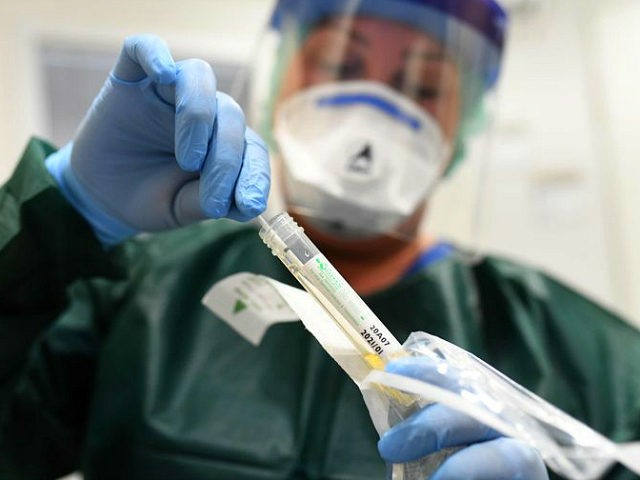Famotidine, the active compound in the over-the-counter heartburn drug Pepcid, has shown promise in treating the novel coronavirus, prompting New York to “quietly” examine the benefits of the medicine in combatting the highly contagious disease, Science Magazine reported over the weekend.
“If we talked about this to the wrong people or too soon, the drug supply would be gone,” Kevin Tracey, a former neurosurgeon in charge of the research at New York City’s Northwell Health hospital system, declared, according to Science Magazine, a peer-reviewed academic journal of the American Association for the Advancement of Science (AAAS).
“If it does work, we’ll know in a few weeks,” he added, later warning, “We still don’t know if it will work or not.”
Northwell Health, a 23-hospital system in New York City that is considered the largest healthcare provider in New York, is conducting the Federal Drug Administration (FDA)-approved study of Pepcid against the coronavirus illness.
On Sunday, Science Magazine revealed:
The fast-growing list of possible treatments for the novel coronavirus includes an unlikely candidate: famotidine, the active compound in the over-the-counter heartburn drug Pepcid. On 7 April, the first COVID-19 [coronavirus illness] patients at Northwell Health in the New York City area began to receive famotidine intravenously, at nine times the heartburn dose.
Unlike other drugs the 23-hospital system is testing, including Regeneron’s sarilumab and Gilead Sciences’s remdesivir, Northwell kept the famotidine study under wraps to secure a research stockpile before other hospitals, or even the federal government, started to buy it.
There were 187 coronavirus patients in critical status participating in the NYC study as of Saturday, including many individuals on ventilations. NYC researchers aim to study a total of 1,174 people. Some coronavirus patients have reportedly shown dramatic improvements after taking famotidine.
Research reportedly shows that famotidine may work against the coronavirus (SARS-CoV-2) by disabling a key enzyme that the disease uses to make copies of itself.
Science Magazine pointed out:
Reports from China and molecular modeling results suggest the drug, which seems to bind to a key enzyme in severe acute respiratory syndrome coronavirus 2 (SARS-CoV-2), could make a difference. But the hype surrounding hydroxychloroquine and chloroquine—the unproven antimalarial drugs touted by President Donald Trump and some physicians and scientists—has made Tracey wary of sparking premature enthusiasm. He is tight-lipped about famotidine’s prospects, at least until interim results from the first 391 patients are in.
Michael Callahan, a globally-renowned infectious disease doctor, was the first medical expert to bring attention to Pepcid in the U.S. Callahan is based at Massachusetts General Hospital.
Working with Chinese health researchers in China’s Wuhan region, the birthplace of the novel coronavirus pandemic plaguing the world, Callahan found the heartburn drug in poor patients who were less likely to succumb to the infection.
“Hospitalized COVID-19 patients on famotidine appeared to be dying at a rate of about 14% compared with 27% for those not on the drug, although the analysis was crude and the result was not statistically significant,” Science Magazine noted. “But that was enough for Callahan to pursue the issue back home.”
Callahan reportedly briefed Dr. Robert Kadlec, the assistant secretary for preparedness and response at the U.S. Department of Health and Human Services (HHS), about the benefits of Pepcid against coronavirus.
The Massachusetts-based doctors also checked in with Robert Malone, the chief medical officer of the contract manufacturing organization Florida-based Alchem Laboratories.
Malone is working on a classified project dubbed DOMANE that relies on computer simulations, artificial intelligence (AI), and other methods to rapidly identify FDA-approved drugs and other safe compounds that can be repurposed to combat new diseases like the one caused by the novel coronavirus.
Together with Joshua Pottel, the president of Montreal-based Molecular Forecaster, Malone used computer modeling to pinpoint Famotidine, the active compound in Pepcid, as a promising medicine against the coronavirus.
The anecdotal data from China in combination with the modeling convinced Callahan to contact the NYC hospital system to run the ongoing double-blind randomized study.
High-doses of famotidine can cause heart problems among coronavirus patients with decreased kidney function so the New York City researchers have excluded them from the study.
The Northwell hospital system used its own fund to carry out the study after getting FDA approval.
According to the research group Pharma, as of early April, “there were 284 clinical trials for potential [coronavirus] treatments and vaccines underway around the United States and the world right now.”

COMMENTS
Please let us know if you're having issues with commenting.